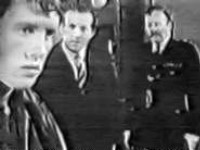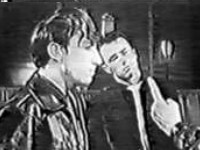Transmitted 10 September 1960
Police surgeon Dr. Geoffrey Brent decides to take a
personal interest in Jim Clark, a juvenile delinquent who is beginning to make repeat
appearances at the police station. Aware that his home life is less than ideal, the Doctor
helps get young Jimmy off the hook for stealing money from a vending machine. Later, they
bump into one another in a cafe, whereupon the Doctor takes the opportunity to play
guidance counselor. Just as the "patient" is beginning to respond to the
"treatment," even demonstrating his improvement by thwarting the efforts of a
group of punks to swipe a violin from an old derelict, he is re-arrested for the vending
machine theft.
Having been conditioned by modern television into the pattern
of half-hour for comedies and one hour for dramas, it was a bit disconcerting watching a
half-hour crime drama, and I was left with the feeling that I had just glimpsed the
B-story excerpts of a full-length program. The result is rather lightweight
and not especially engaging.
This aside, as the predecessor to The Avengers the
show is still an intriguing study: it is not an especially flattering portrayal of police
work, as it features some non-stereotypical, startlingly human officers—flawed, even dim.
Ian Hendry's Dr. Geoffrey Brent is not dissimilar to Dr. David Keel—broody,
distracted, mumbling. No one is especially outstanding in the acting
department save for guest Michael Crawford, who was exceptional as the juvenile delinquent.
Technically the program is typical of the
"taped live" studio productions of the day, right down to the posterized credit
slides and quasi-jazz music score, although it was considerably less ambitious in
production design than The Avengers, with most scenes dominated by dialog. While
there were a couple of awkward scene transitions, there were no obvious technical flaws.
|
|




|